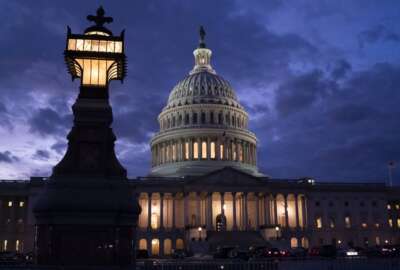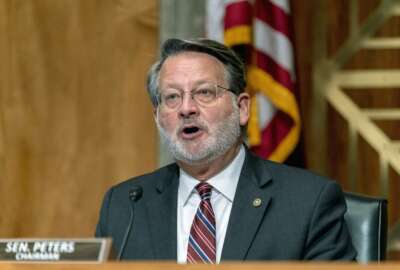MSPB can chip away case backlog ‘almost immediately,’ having regained first quorum in 5 years
Federal employees looking to appeal an adverse personnel action might not have to wait on the Merit Systems Protection Board much longer. The Senate ends a...
Federal employees looking to appeal certain adverse personnel actions might not have to wait on the Merit Systems Protection Board much longer.
The board this week regained a quorum after a long period of vacancies on the board.
The Senate on Tuesday confirmed two of President Joe Biden’s nominees to serve on the board — Raymond Limon, the Interior Department’s chief human capital officer, and Tristan Leavitt, MSPB’s general counsel.
Biden’s pick to serve as MSPB’s chairwoman, long-time federal employment attorney Cathy Harris, remains pending in the Senate.
The Senate confirmation of two MSPB members ends a five-year streak in which the board lacked a quorum.
MSPB looks to protect federal employees against prohibited personnel practices, including whistleblower retaliation, by adjudicating employee appeals.
The board now faces the task of clearing out a backlog of more than 3,600 cases that have piled up over the years. Its members, however, have tools and methods available to them to help clear the backlog.
Mark Robbins, a former MSPB board member, and the last member to serve on the board prior to this week’s Senate confirmations, said the board could start chipping away at the backlog “almost immediately,” depending on how they decide to triage those cases.
The board, Robbins said, could opt for a “first-in, first-out” method of processing cases in the backlog, or focus on a particular category of cases, such as cases where federal employees allege wrongful termination or whistleblower retaliation.
Jim Eisenmann, a former executive director and general counsel for the MSPB, now a partner at Alden Law Group, said that while the board has lacked a quorum for the past five years, MSPB’s Office of Appeals Council continues to work on drafting decisions.
“I suspect there are thousands of draft opinions waiting for the two confirmed board members to start looking at, reviewing and then issuing — because they don’t have to wait for a third member. They are a quorum with two and they can issue those decisions,” Eisenmann said.
If the board, above all else, wants to reduce the backlog quickly, Robbins said they could prioritize cases with a clear-cut outcome.
“What Ray [Limon] and Tristan [Leavitt] could do is take the easy cases, the ones where they just take a quick look, and this case either warrants being remanded back to the agency for reinstatement, or this case is so beyond the pale that the employee deserves the adverse action that was needed,” he said.
Robbins said the board, if it took this approach, could probably cut the backlog roughly in half in a relatively short period of time. He said the board, during the part of his tenure when there was a quorum, reached a unanimous decision on the “vast majority” cases before them.
“That’s a little like getting up on a Saturday morning, knowing you’ve got eight chores to do over the weekend, and you take the four of them that are real easy, and you do them quickly. And then you say, ‘Oh, look, I’ve gotten four of my eight done,’ but the other four are the ones that are going to take some heavy lifting. It’s a little bit of a numbers game, but there’s a bit of psychology there. It’s nice to know you’ve tackled quite a bit of the backlog, and in terms of individual appellants, you will have rendered the decision that they were waiting for, and the ones that are still waiting are the ones with the more complicated cases,” he said.
Administrative judges at MSPB can issue initial decisions, but if an agency or employee wants to file a petition for review of a decision, the board can’t issue a decision without a quorum.
Robbins said the administrative judges working out of MSPB’s eight field offices throughout the country have been “working nonstop” since the board lost its quorum, and have been rendering decisions even in the absence of a quorum.
“While there’s a backlog, the backlog is just a portion, a percentage, of all the cases that filed with the board during the five years without a quorum,” Robbins said.
Among the tools the board could use to clear the backlog faster, Eisenmann said it could decide more cases through “short-form” opinions.
Unlike a full-blown precedential opinion that unpacks the case and the board’s decision in detail, a short-form opinion gives employees little explanation when the board doesn’t decide in their favor.
“There’s a real good chance that we’re going to see short-form decisions coming back. It’s just an easier way of getting those decisions out to the parties. And I suspect when people get those decisions, having waited a while, they will not be happy because they don’t necessarily know why they lost,” Eisenmann said.
Eisenmann said that until about 2011, the board handed down about 70% of its decisions through short-form opinions, but then opted for more precedential opinions, even in cases that didn’t warrant so much detail.
Robbins said MSPB’s decision to issue more precedential decisions happened before his tenure, but said the board would benefit from using more short-form opinions for cases where the new members agree
“If I recall the rationalization, it’s that everyone deserved an analysis of their claims and a document that explained why they were winning, or more importantly, why they were losing,” Robbins said about the board’s move toward more precedential opinions.
“That’s great if you’ve got all the time in the world and you’ve got all the resources in the world, but that’s not where the board is anymore. That luxury, I’m afraid, needs to be jettisoned, when it’s warranted with relatively easy cases,” he added.
While the absence of a quorum has created bottlenecks, most federal employees have had alternative methods to seek redress.
Federal employees wanting to resolve their cases quickly could, in many but not all circumstances, take their case to the U.S. Court of Appeals for the Federal Circuit, although that route comes with its own challenges.
“That’s a little complicated because it costs money, and now it means you’re in federal court, so in most cases, you’ve got to get a lawyer, and the lawyer has to know how to work through the federal judicial process, but it’s there,” Robbins said.
Stephanie Rapp-Tully, a federal employment attorney and partner at the law firm Tully Rinckey, said her firm, at some point, held off on filing petitions for review, because the timeline for MSPB to regain a quorum appeared so uncertain.
“Employees are going to be encouraged now to go this route, whereas they were not previously encouraged,” she said.
Rapp-Tully said the “most instant relief” will come for employees who have waited the longest time for MSPB to decide on their case. But the backlog, she added, could take years to eliminate and jam up the process for new cases.
“People filing for a petition for review tomorrow are still going to have to deal with the fact that there’s this large backlog,” she said.
Federal management associations celebrated MSPB regaining a quorum, but also raised concerns about the long-term consequences of Senate inaction.
Chad Hooper, the executive director of the Professional Managers Association, said the lack of a quorum at MSPB has meant some IRS supervisors are “left in a state of limbo, waiting years to determine when cases will be solved.”
Hooper said taxpayer services also take a hit when IRS supervisors are forced to keep positions open, in case disciplined employees are reinstated, “leaving positions sporadically filled with temp employees who may lack the knowledge and expertise needed for the role.”
“Most importantly, the Senate’s failure to fill these vacancies have left the federal workforce without a watchdog of employee rights and left taxpayers without an important mechanism for accountability in their government. This has wasted resources and wasted time,” Hooper said.
Bob Corsi, the president of the Senior Executives Association, said that MSPB, when it functions, affirms the agency’s decision in over 80% of cases, “making clear the government can be trusted when it has a watchdog to account for agency actions.”
But the other nearly 16% of cases, Corsi said employees are reinstated because the agency erred or violated their rights.
“In these instances, taxpayers must pay to rectify the agency’s mistake. The back pay price tag has steadily increased each day the MSPB remained vacant. Not only was the hollowed MSPB a governance mistake, but it was also a waste,” Corsi said.
Federal employees reinstated through an MSPB ruling are entitled to back pay and their old job back. But Eisenmann said agencies may have a hard time giving reinstated federal employees what they’re looking for, especially if they’ve been waiting years for the board to handle their case.
“All that comes with the back pay, the interest, calculating all the missed benefits. That is a herculean task to go through, not the least of which is trying to figure out, if that person’s been gone for several years, where do you put them,” Eisenmann said.
Eisenmann said federal employees who have had a case pending before MSPB are closer to a resolution, but said they should remain patient.
“Things are not going to happen overnight, but things will happen. I think that cautious optimism probably is a good way of putting it. Being patient, continuing to be patient, which they already have, needs to be the order of the day for a while,” he said.
Copyright © 2025 Federal News Network. All rights reserved. This website is not intended for users located within the European Economic Area.
Jory Heckman is a reporter at Federal News Network covering U.S. Postal Service, IRS, big data and technology issues.
Follow @jheckmanWFED






